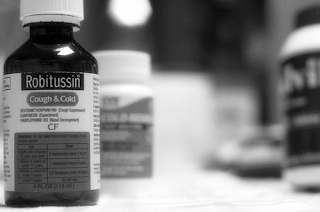Based on the presence of mucus, cough can be divided into nonproductive and productive. Based on the duration of the cough, it can be divided into acute, subacute, and chronic.
 |
| Cough is a protective reflex. |
Nonproductive cough does not produce mucus. A dry, hacking cough may develop toward the end of a cold or after exposure to an irritant, such as dust or smoke. There are many causes of a nonproductive cough, such as viral infection, allergies, asthma, ACE inhibitor drugs that are used to treat hypertension, exposure to dust, fumes, or chemical irritants, smoking, and blockage of the airway by an inhaled object such as food or a pill.
Productive Coughs
A productive cough produces phlegm or mucus (sputum). Any part of the airway from the nose down to the bronchioles has the ability to produce mucus in reaction to infection or irritants. Because coughing clears away the mucus, it should not be suppressed. Infection, both viral or bacterial is the most common cause of a productive cough. Chronic obstructive pulmonary disease (COPD) and heart failure may also cause productive coughs.
Acute Coughs
Acute coughs start suddenly and can last up to 3 weeks. In most cases, an upper respiratory tract infection like the common cold or influenza and allergic rhinitis are to blamed for acute coughs. Less commonly, a lower respiratory tract infection such as bronchitis and pneumonia is causing the cough.
Subacute Coughs
Subacute coughs persist between 3-8 weeks. It usually lingers after a respiratory infection is gone. Other causes include allergic conditions such as hay fever.
Chronic Coughs
Chronic coughs persist after 8 weeks. Common causes of chronic coughs are chronic obstructive pulmonary disease, allergies, heart failure and asthma. A chronic cough may be an early symptom of lung cancer. Tuberculosis is rare in developed countries, but in other parts of the world especially in developing countries with high population, it remains a public health problem.
To treat or not to treat?
 |
| Do not use cough suppressants in productive cough. |
One of the most common cause of any type of cough is viral infection. Antibiotics do not alter the course of viral infections and are useless in this setting. Cough suppressants will make things worse in cases of productive coughs. So the bottom line is, it's wiser to find out the real cause and seek treatment for that condition instead.